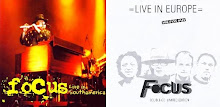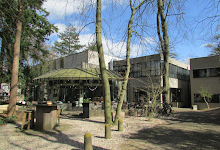Archive number: 146
Title:
Song for EvaMain Album: The Focus Family Album
Track number: 2
Genre: Jazz Rock
Studio: Unknown
Length: 9:31
Composer: Thijs van Leer/Lord Byron
Musicians: Thijs van Leer - Piano, Organ, Voice; Menno Gootjes - Guitars, Udo Pannekeet - Bass, Pierre van der Linden - Drums
Producer: Geert Scheigrond
Engineer: Geert Scheigrond
Label: In and Out of Focus Recordings
Date of recording/release: 2017
Alternative version: Introspection 4
Notes: Eva is Thijs's oldest daughter and he wrote this song for her. It was used as the theme (using the original version) to a 1978 Dutch TV drama called Exit 7.
We begin with piano and Thijs speaks the Byron poem below supported by the band. After about a minute the guitar leads with a repeated slow yearning strain that carries the main theme. This continues until 4:05 when a more jazzy guitar leads another passage, increasingly complex. This eventually blends back into something like the previous theme, which is repeated from 7:17. In the last 50 seconds the whole thing winds down in the manner with which the section began at 4:05 but coming to a close this time.
Words (Lord Byron)
They say that Hope is happiness;
But genuine Love must prize the past,
And Memory wakes the thoughts that bless:
They rose the first - they set the last;
And all that Memory loves the most
Was once our only Hope to be,
And all that Hope adored and lost
Hath melted into Memory.
Alas! it is delusion all:
The future cheats us from afar,
Nor can we be what we recall,
Nor dare we think on what we are.
Note Lord Byron (from Wikipedia) - George Gordon Byron, 6th Baron Byron, FRS (1788–1824), known simply as Lord Byron, was a British peer, who was a poet and politician. He was one of the leading figures of the Romantic Movement and is regarded as one of the greatest British poets. He remains widely read and influential. Among his best-known works are the lengthy narrative poems Don Juan and Childe Harold's Pilgrimage; many of his shorter lyrics in Hebrew Melodies also became popular. This poem is from the latter source.
He travelled extensively across Europe, especially in Italy, where he lived for seven years in Venice, Ravenna and Pisa. During his stay in Italy he frequently visited his friend and fellow poet Percy Bysshe Shelley. Later in life Byron joined the Greek War of Independence fighting the Ottoman Empire and died of disease leading a campaign during that war, for which the Greeks revere him as a national hero. He was 36 when he contracted the fever that killed him, after the First and Second Siege of Missolonghi.
His only legitimate child, Ada Lovelace, is regarded as a foundational figure in the field of computer programming, based on her notes for Charles Babbage's Analytical Engine. Byron's illegitimate children include Allegra Byron, who died in childhood and, possibly, Elizabeth Medora Leigh.




















